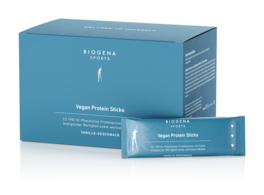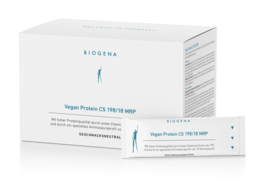Protein powders lost their reputation as being only for “muscleheads” quite a while ago. Nowadays, athletes in all disciplines supply their bodies and muscles with high-quality additional protein. Protein powder is also a topic in the case of weight problems and for older people. However, thanks to the large selection, many interested parties question which protein powder is best. Let us throw some light on the matter.
What proteins are there in protein powder?
Protein powder can be produced from a variety of plant or animal sources. Animal-based preparations often consist of whey protein and/or casein. Plant-based protein powders typically use pea protein, rice protein, sunflower protein, hemp protein, chickpea protein, soy protein, lentil protein and/or locust bean endosperm protein – individually or mixed.
Best protein sources: Ingredients compared
Animal protein sources
Animal protein powders often have a higher biological value than individual plant sources. This tendency can be explained by the fact that the amino acid profile (= the composition of the protein components) of animal protein has many parallels to those of human body protein and can therefore be better utilised by the human body. Animal protein powders are often based on whey and/or casein protein.
What is whey protein?
Whey protein accounts for around 20% of milk protein. Whereas whey was previously mainly seen as a “waste product” of cheese and quark production, it is now processed into valuable products such as whey protein. Whey protein has the advantage of being absorbed quickly by the body. This makes whey protein of interest, especially during or directly after muscle training. Whey protein can have a biological value of 106.
Casein protein
Casein accounts for around 80% of the milk’s total protein and has a biological value of 77. Compared to whey protein, casein is metabolised more slowly, thus ensuring a constant amino acid level over many hours. So while whey is the sprinter among milk proteins, casein is the marathon runner.
Plant or vegan protein sources
Increasing numbers of people are choosing not to use animal foods – or to cut down on them as much as possible – for ethical reasons, some for health reasons and some simply because they do not tolerate lactose well. However, when it comes to supplementing high-quality protein, plant food lovers do not have to compromise.
Pea protein, rice protein, sunflower protein, hemp protein, chickpea protein, soy protein, lentil protein and locust bean endosperm protein are commonly used to produce herbal protein powders. While it is true that plant-based single protein is often inferior to animal sources, ingenious plant combinations can achieve an exceptionally high biological value.
A prime example of this is the veganeo protein powder from Anovona used by BIOGENA, which has an unbeatably high biological value with a chemical score of 198. Developed by doctors, only plant-based protein sources are used – for example, a combination of rice and pea protein or a combination of pea, rice, sunflower and locust bean endosperm protein.
What is the best vegan protein?
The best vegan protein does not come from a single source, but is an expert blend of several plant-based sources. Finally, clever combinations on the respective amino acid profile of a protein powder can be tinkered with so that a highly usable protein powder is formed.
Perfected for the production of BIOGENA protein powder, 18 optimally matched amino acids, including all 8 essential amino acids, provide outstanding biological quality and an unrivalled chemical score of 198 points, all of which is 100% vegan and soy-free.
Best protein powder for muscle growth
Protein is the substance that our muscles are made of. Accordingly, successful muscle growth is not only a question of training, but also requires a sufficiently high intake of highly usable protein. With a Chemical Score (CS) of 198, the veganeo protein powder from Anovona used in BIOGENA products is at the top of the list.
The biological value, also called the Chemical Score (CS), refers to the reference protein of the World Health Organization (WHO), which represents the perfect ratio of amino acids for humans. Perfect means here, that the amino acid composition of the proteins supplied to our bodies comes close to the human need to build the body’s own protein.
Best protein for gaining weight
People who want to gain weight should not become fast food and sweet junkies. Because, while these dishes usually have a high calorie density, their nutritional value (= vitamin and mineral content) is usually low. Thus poor prerequisites for healthy weight gain.
People with a low weight should instead consider building muscle mass. This is far more expedient than just gaining fat. Protein powder can help with this project.
The best protein for gaining weight should be high in protein, ideally provide an additional range of vitamins and minerals, and also be tasteless if possible. The latter allows any main or snack – whether sweet or savoury – to be enriched with the protein powder, thus enhancing its nutrient density and amino acid profile.
Best protein powder for weight loss
Protein powders not only help to strengthen the muscles of athletes, they can also help you to lose excess kilos when used correctly.
The best protein powders for weight loss provide high-recyclable protein with a full spectrum of vitamins and minerals, but no excessive calories, sugars or low-quality fats. Mixed as a protein drink, they can replace a complete meal and support weight loss in a calorie-controlled diet.
Our test winners
CONCLUSION: Highly versatile protein powders do not have to be of animal origin. There are now vegan protein blends that more than compare with the biological quality of animal protein.
Frequently asked questions
Protein powders with an ideal ratio of amino acids and a particularly high chemical score can be used most effectively by our bodies.
The healthiest protein powder has excellent protein levels, but does not provide unnecessary additives, sugars or low-quality fats.
As is well known, everyone has a different opinion about tastes. Therefore, BIOGENA decided to offer the BIOGENA SPORTS – Vegan Protein Sticks with either a delicate vanilla flavour, or as a flavour-neutral version with Vegan Protein CS 198/18 MRP, which can be easily stirred into sweet and spicy meals and drinks.
Protein shakes are better than a bar if you want to target protein without adding more macronutrients (carbohydrates, fats).










